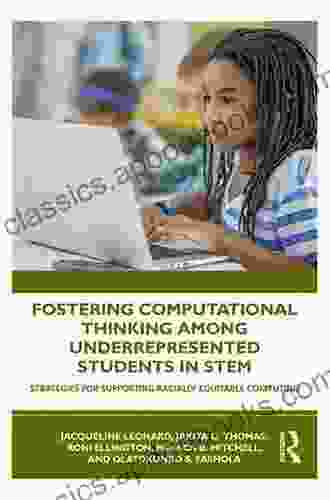Strategies For Supporting Racially Equitable Computing

: Embracing Racial Equity in Computing Education
In the rapidly evolving landscape of computing, where technology permeates every aspect of our lives, the need for racially equitable computing education has never been more pressing. The persistent underrepresentation and inequities faced by students of color in computing fields call for urgent action from educators, practitioners, and policymakers.
5 out of 5
| Language | : | English |
| File size | : | 21400 KB |
| Text-to-Speech | : | Enabled |
| Screen Reader | : | Supported |
| Enhanced typesetting | : | Enabled |
| Word Wise | : | Enabled |
| Print length | : | 224 pages |
This comprehensive guidebook, "Strategies For Supporting Racially Equitable Computing," is a transformative resource designed to empower educators and practitioners in their mission to create inclusive and equitable computing learning environments for all students. Drawing upon cutting-edge research, real-world examples, and inspiring stories, this guidebook offers a roadmap for fostering racial equity in computing and inspiring a new generation of diverse and engaged problem-solvers.
Chapter 1: Understanding Racial Inequities in Computing
To effectively address racial inequities in computing, it is crucial to have a deep understanding of their root causes. This chapter delves into the historical and systemic factors that have contributed to the underrepresentation of students of color in computing fields. It explores the impact of stereotypes, biases, and exclusionary practices on the educational experiences and career aspirations of these students.
Chapter 2: Creating Inclusive and Equitable Classroom Environments
Building a welcoming and inclusive classroom environment is essential for fostering equitable computing education. This chapter provides educators with practical strategies to create a classroom culture that values diversity, respects different learning styles, and encourages all students to participate and succeed. From establishing clear expectations to promoting collaboration and peer support, this chapter offers a comprehensive approach to creating a supportive and inclusive learning environment.
Chapter 3: Culturally Responsive Pedagogy and Curriculum
Culturally responsive pedagogy and curriculum are foundational elements of equitable computing education. This chapter explores how to incorporate culturally relevant content, perspectives, and teaching methods into computing instruction. By connecting computing concepts to students' lived experiences and cultural backgrounds, educators can make computing more accessible, engaging, and relevant for all students.
Chapter 4: Supporting Students from Underrepresented Groups
Students from underrepresented groups may face unique challenges and barriers in computing education. This chapter provides educators with specific strategies to support these students, including mentoring, outreach programs, and targeted interventions. From addressing imposter syndrome to building confidence and leadership skills, this chapter offers practical guidance for creating a supportive and empowering learning environment for all students.
Chapter 5: Building Partnerships for Systemic Change
Achieving racial equity in computing education requires collaboration and collective action. This chapter emphasizes the importance of building partnerships with community organizations, industry leaders, and higher education institutions. By leveraging external resources and expertise, educators can expand their impact and create a more comprehensive and sustainable support system for students from underrepresented groups.
: The Power of Equitable Computing
Equitable computing education is not just a moral imperative; it is an investment in our future. By fostering racial equity in computing, we open doors to new talent, perspectives, and innovations that will benefit society as a whole. This guidebook is a call to action for educators and practitioners to embrace the transformative power of equitable computing and create a more just and inclusive world for all.
Through the transformative strategies outlined in this guidebook, educators and practitioners can empower students from all backgrounds to reach their full potential in computing and become the next generation of innovators, problem-solvers, and leaders.
### Alternative Image Alt Attribute:
[Book cover of "Strategies For Supporting Racially Equitable Computing"] A comprehensive guidebook filled with insights, real-world examples, and inspiring stories to empower educators in fostering racial equity in computing education.
5 out of 5
| Language | : | English |
| File size | : | 21400 KB |
| Text-to-Speech | : | Enabled |
| Screen Reader | : | Supported |
| Enhanced typesetting | : | Enabled |
| Word Wise | : | Enabled |
| Print length | : | 224 pages |
Do you want to contribute by writing guest posts on this blog?
Please contact us and send us a resume of previous articles that you have written.
 Book
Book Novel
Novel Page
Page Chapter
Chapter Text
Text Story
Story Genre
Genre Reader
Reader Library
Library Paperback
Paperback E-book
E-book Magazine
Magazine Newspaper
Newspaper Paragraph
Paragraph Sentence
Sentence Bookmark
Bookmark Shelf
Shelf Glossary
Glossary Bibliography
Bibliography Foreword
Foreword Preface
Preface Synopsis
Synopsis Annotation
Annotation Footnote
Footnote Manuscript
Manuscript Scroll
Scroll Codex
Codex Tome
Tome Bestseller
Bestseller Classics
Classics Library card
Library card Narrative
Narrative Biography
Biography Autobiography
Autobiography Memoir
Memoir Reference
Reference Encyclopedia
Encyclopedia Talmadge Walker
Talmadge Walker Andy Crouch
Andy Crouch Fabio Crestani
Fabio Crestani Andrey Taranov
Andrey Taranov Andy Bollen
Andy Bollen Jill White
Jill White Andrew Malan Milward
Andrew Malan Milward Mitchell Mancini
Mitchell Mancini Charles Levenback
Charles Levenback Judy Tzu Chun Wu
Judy Tzu Chun Wu Marianne Mckiernan
Marianne Mckiernan Andrew Walsh
Andrew Walsh Thomas Hobbes
Thomas Hobbes Helen Barr
Helen Barr Kennette Thigpen
Kennette Thigpen Andy Ankowski
Andy Ankowski Andrew Moodie
Andrew Moodie Blou Bliss
Blou Bliss Elizabeth C Manvell
Elizabeth C Manvell Martin Hegel
Martin Hegel
Light bulbAdvertise smarter! Our strategic ad space ensures maximum exposure. Reserve your spot today!

 Brian BellUnveiling the Intricate Web of Politics, Economy, Culture, and Technology: A...
Brian BellUnveiling the Intricate Web of Politics, Economy, Culture, and Technology: A... Jaden CoxFollow ·3.3k
Jaden CoxFollow ·3.3k Isaac BellFollow ·3.8k
Isaac BellFollow ·3.8k Clark BellFollow ·8.2k
Clark BellFollow ·8.2k Greg FosterFollow ·2.1k
Greg FosterFollow ·2.1k Juan ButlerFollow ·8.5k
Juan ButlerFollow ·8.5k Roald DahlFollow ·4.9k
Roald DahlFollow ·4.9k Bryan GrayFollow ·2.5k
Bryan GrayFollow ·2.5k Chance FosterFollow ·9.6k
Chance FosterFollow ·9.6k

 Devin Ross
Devin RossUnlocking the Secrets of the Mind: Brain Mapping...
The human...

 Jacob Foster
Jacob FosterNovel of Misconception, Truth, and Love: A Journey of...
Unraveling the Lies We...

 Benji Powell
Benji PowellThe Only Technique You Will Ever Need: Unlocking the...
By [Author's...

 Pete Blair
Pete BlairUnveiling the Enchanting World of 'Magnolia House' by...
A Literary...
5 out of 5
| Language | : | English |
| File size | : | 21400 KB |
| Text-to-Speech | : | Enabled |
| Screen Reader | : | Supported |
| Enhanced typesetting | : | Enabled |
| Word Wise | : | Enabled |
| Print length | : | 224 pages |














